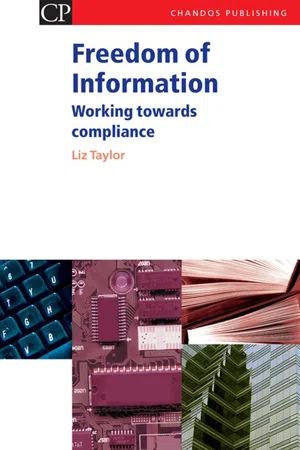
- 136 pages
- English
- ePUB (mobile friendly)
- Available on iOS & Android
About this book
As from 1 January 2005, Freedom of Information (FOI) legislation will come fully into force throughout the UK and could potentially change the way in which the public sector manages information. This report provides practical advice on how to achieve compliance with the Acts; the report helps to ensure successful management of the key risks that the Acts may pose to organisations across the UK. The report also introduces some of the change management issues that will need to be addressed within organisations to facilitate the transition to a more open culture of FOI.- Suggestions for the practical implementation of FOI, focusing on processing requests for information- Checklists that will enable those responsible for FOI implementation to monitor organisational progress towards compliance- Easy-to-read and discrete chapters that allow quick referencing for each subject within the book
Frequently asked questions
- Essential is ideal for learners and professionals who enjoy exploring a wide range of subjects. Access the Essential Library with 800,000+ trusted titles and best-sellers across business, personal growth, and the humanities. Includes unlimited reading time and Standard Read Aloud voice.
- Complete: Perfect for advanced learners and researchers needing full, unrestricted access. Unlock 1.4M+ books across hundreds of subjects, including academic and specialized titles. The Complete Plan also includes advanced features like Premium Read Aloud and Research Assistant.
Please note we cannot support devices running on iOS 13 and Android 7 or earlier. Learn more about using the app.
Information
Introduction to Freedom of Information legislation
Publisher Summary
Background
Basic facts about the Acts




How to use this book
Table of contents
- Cover image
- Title page
- Table of Contents
- Copyright
- Acknowledgements
- URLs
- About the author
- Chapter 1: Introduction to Freedom of Information legislation
- Chapter 2: Where to start
- Chapter 3: Preparing your information
- Chapter 4: Procedures for dealing with requests
- Chapter 5: Exemptions
- Chapter 6: Audit trails, proving compliance and other considerations
- Chapter 7: Training
- Chapter 8: Evaluating success and organisational benefits